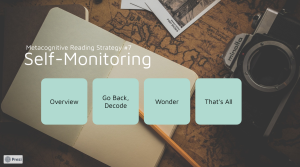23 Self-Monitoring
Learning Objectives
-
Understand the value of stopping and self-evaluating when you are reading.
-
Use metacognitive reading strategies before, during and after reading fiction, non-fiction and graphics.
Chapter & Discussion
This chapter includes a presentation that can be navigated in a classroom setting or independently. You can access the presentation via the link below.
Strategy Seven: Self-Monitoring
Work through the different sections of the chapter and discuss ideas and topics as they arise. If you’re working independently, take notes instead. Notes and active discussion will be helpful in navigating this week’s assignments.
Overview
The final metacognitive reading strategy is to self-monitor your understanding as you read. Strong readers know when they don’t understand the text they are reading. This is a good thing. When you know that you didn’t understand something, you can go back and decode it.
When you read, you will often come to a stop. This is usually for one of two reasons:
- You didn’t understand what you just read
- Or, you are taking a moment to think about what you just read (or an idea that your book reminded you of)
Self monitoring can help you decide what to do next, making the best use of this time.

Go Back, Decode
One of the reasons we stop is because we didn’t comprehend what we just read. This can be for many reasons, but the two most common are:
- The reading is challenging
- You aren’t focusing right now
If the reading is challenging, causing you to read without comprehending, go back and try that paragraph again. Look for keywords and main concepts. Try to decode new vocabulary words from context, highlight challenging passages, and break it down into smaller pieces.
If you stopped because you aren’t focusing, try the paragraph again. If you still aren’t focusing after a third try, just stop reading for now. You can always come back later.
Wonder
If you stopped because the passage gave you an idea, made you think of something else, or reminded you of something, good. That’s actually an important part of reading!
Books are supposed to remind you of your experiences. That’s how they make new neural pathways and connect to prior knowledge.
Books are supposed to spark ideas. That’s how you become a part of the conversation and take an active role in your reading.
When you stop to wonder, embrace your thoughts. Let yourself wonder. You’ll come back when you’re ready. When you do, it will be with more things to consider, which is what makes active readers.

Assigned Reading
Here are this week’s readings. Additionally, please read for your own personal enjoyment for 1/2 hour each day. This will be called your “Reading Zone” reading and it will coincide with many upcoming activities.
Procrastination by Thomas Frank (via Crash Course)
Problem Set: Practice Your Skills!
Click here to complete a ten-question problem set on concepts in this chapter.
Completing problem sets like this can be an important element of independent study towards completing your HSE. I write these to resemble the style of questions you’ll find on the Reading and Language Arts GED.
Assignment: GED Ready or Official GED
Complete a GED Ready test for Reading & Language Arts using your GED.com account. If you score 145 or higher, schedule your official GED test.
If cost is a concern, please look into your local Adult Basic Education program (most likely through your local community college). They will have programs to reduce or eliminate the cost of the exams and the GED Ready tests.
Assignment: Reading Zone Response (250 Words)
For Reading Zone, you must find a novel that is interesting to you and enjoyable to read. If you need help finding a Reading Zone book, please ask. Please read your Reading Zone book for a half-hour each day. On class days, there will be time in class dedicated to reading.
Create a two-paragraph response to the reading you did this week. The first paragraph should summarize what you read this week. The second paragraph should address the following prompt:
When you stopped and thought during your reading this week, what did you think about? How has this book sparked your curiosity?
Attributions
Duke, N. K., & Pearson, P. D. (2002). Effective practices for developing reading comprehension. In A. E. Farstrup & S. J. Samuels (Eds.), What research has to say about reading instruction (3rd ed) (pp. 205-242). Newark, DE: International Reading Association. Reprinted in Journal of Education, 189, 107-122.
Mills, Kathy A. (2008) The Seven Habits of Highly Effective Readers. In Proceedings Stories, Places, Spaces: Literacy and Identity, National conference by the Australian Literacy Educators’ Association (ALEA) and Australian Association for the Teaching of English, Adelaide, SA.


